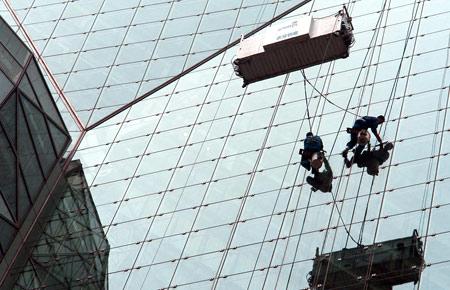
Workers cleaning a curtain wall on a building in Beijing. Yuanda's business is growing rapidly, with the 2008 contract value of its business topping 2 billion yuan. [File photo]
Wang Weiyuan was napping in the departure area of Beijing International Airport terminal 3 recently, waiting for the first flight to Dubai, the capital of the United Arab Emirates.
As the top official from Shenyang Yuanda Enterprise Group, China's largest building facade system provider, most of his time during the past three years was spent shuttling between Beijing and Dubai.
"Although impacted by the Dubai debt crisis, our business in the country is still robust," said Wang, president of Yuanda's United Arab Emirates (UAE) subsidiary. "I need to utilize as much time as I can to get some rest as we will start negotiations with our local clients right after we land."
In late November, the UAE government announced it would seek to postpone repayments on Dubai World's $26 billion debt, and world markets have been coping with the news ever since.
Liu Shoutao, general manager of Yuanda's subsidiary in the UAE, said the crisis is a good thing for Yuanda as "it forced many unqualified competitors out of the market". And since local customers know the company, Yuanda often lands the order without bidding, he said.
The company expects its business in the UAE next year, where it controls approximately one third of the curtain-wall market, will remain largely unchanged from 2009.
As China's top provider of curtain walls, the company provided the facade for several well-known 2008 Olympic venues like the Beijing National Stadium (Bird's Nest) and the Water Cube National Swimming Center. Curtain walls are designed to span multiple floors and take into consideration thermal expansion and contraction, building sway, water diversion and thermal efficiency.
In the UAE, Yuanda's business has grown rapidly since it entered the market five years ago, with the 2008 contract value of its business topping 2 billion yuan. That boosted the company's revenue from the Middle East region from 660 million yuan in 2007 to 4.3 billion yuan last year, and accounted for 23.9 percent of total revenue.
With the onset of the global recession, Dubai's real estate market declined after a six-year boom. Last month, Dubai announced that it intends to ask all providers of financing to state-owned Dubai World and its real estate subsidiary Nakheel, to "standstill", putting the emirate at the center of global-market attention on fears that it may struggle to repay its debts.
Still, Wang Weiyuan shrugged off market concerns. instead, emphasizing that the company will continue to do well in the UAE because it has great respect for local culture and religion.
"This market is very different from China, European countries and the United States. We needs to pay special attention to the cultural and religious differences if we want to do business there," said Wang.
He said Yuanda sends many members of its marketing staff to Middle Eastern countries every year, but only one-third of them actually manage to adapt to the local markets and stay on. Yuanda's employees also need to memorize the over 100 festivals held every year in Islamic countries.
As a private firm, over half of Yuanda's business comes from foreign markets. The company currently has 15,000 employees across the country and its staff in the Middle East has surpassed 500.





